Mango Kush (aka Mango OG, Mango Cannabis)
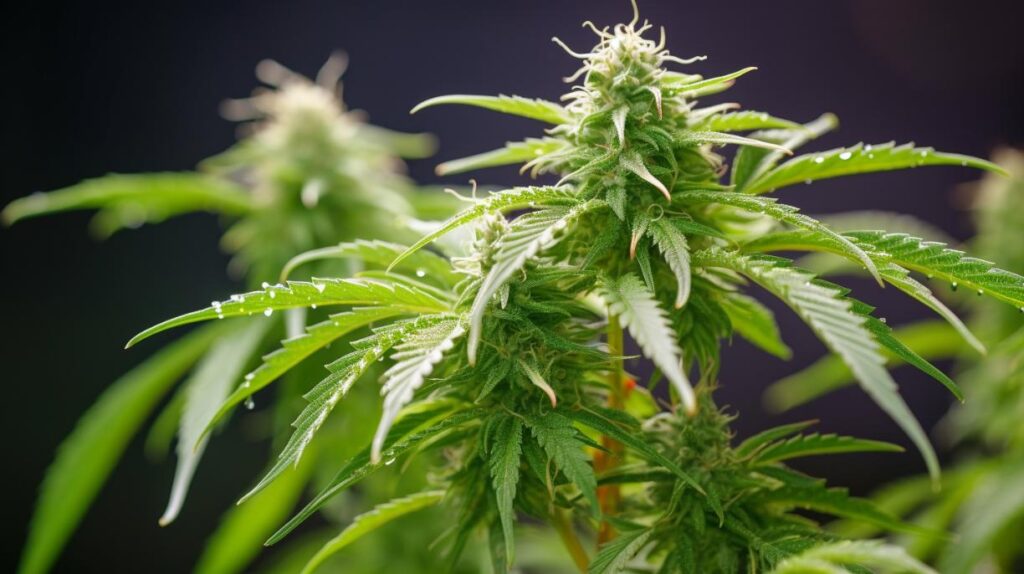
Mango Kush is a noteworthy strain within the cannabis community, revered not only for its distinct flavor profile but also for its therapeutic potential. As an indica-dominant hybrid, it purportedly marries the robust genetics of Mango and Hindu Kush, resulting in an aromatic tapestry rich with sweet, fruity notes reminiscent of its namesake.
The strain’s balanced THC content presents a nuanced spectrum of effects that cater to both recreational enjoyment and medicinal relief. While enthusiasts gravitate towards Mango Kush for its capacity to induce a state of mirth and relaxation, its impact on conditions such as stress and anxiety is of significant interest to the medical community.
However, the complexity of Mango Kush extends beyond its surface characteristics and into the intricate dance of its terpenes and cannabinoids, the exploration of which unveils a deeper understanding of its place in both the cultural zeitgeist and its potential applications in therapeutic contexts.
Genetic Lineage
Delving into the genetic heritage of the Mango Kush strain, we find a complex tapestry woven predominantly from the genes of the indica-dominant Hindu Kush and the sativa-accented Mango, culminating in a hybrid noted for its robust myrcene levels and tropical bouquet.
This Kush strain represents a sophisticated fusion of two cannabis cultures: the earthy, resinous qualities inherent in its Hindu Kush ancestry, and the invigorating, fruity essence borrowed from the Mango variety.
The genetic interplay between the indica and sativa lineages endows Mango Kush with a nuanced spectrum of effects and flavors, leaning towards the calming relaxation typically associated with indica-dominant strains, while retaining the uplifting notes of its sativa counterpart.
The genetic contributions of Hindu Kush are particularly significant, imbuing the strain with a sturdy framework for high trichome production, which is likely responsible for the girthy, well-frosted buds that are characteristic of Mango Kush.
Renowned for its adaptability to both indoor and outdoor cultivation, the strain’s genetic resilience can be partly attributed to the selective breeding efforts by cultivators, including those from seed banks like KC Brains. These breeders have meticulously crafted and stabilized the Mango Kush lineage, ensuring its enduring popularity among cannabis connoisseurs and cultivators alike.
THC/CBD Content
The Mango Kush cannabis strain boasts a THC concentration ranging from a modest 11% to a more potent 20%, while maintaining a low CBD level of approximately 0.3%. As an indica-dominant hybrid, Mango Kush is recognized for providing consumers with a relaxing and somewhat sedative experience, without an overwhelming psychoactive intensity. This makes the strain particularly appealing to those new to cannabis or sensitive to higher THC levels.
A detailed examination of Mango Kush’s chemical profile reveals that the strain’s moderate THC content is adept at delivering a mild yet effective upper body buzz. This property is often sought after by individuals looking to alleviate stress or combat insomnia, as the soothing effects can induce a state of calm and help usher in sleep.
Furthermore, Mango Kush marijuana strain is distinguished by its thick shiny trichomes, which are indicative of the strain’s quality and potency. These resin glands are not only visually impressive but also serve as the epicenter for cannabinoid production. Despite the relatively low CBD content, the THC concentration measured up to 16% is significant for those desiring a nuanced buzz that is both enjoyable and manageable.
Terpene Profile
Building on the understanding of Mango Kush’s cannabinoid content, it is the strain’s rich terpene profile that further defines its distinctive character, offering a unique combination of aromas and effects that enhance its overall appeal. Myrcene, the prominent terpene in Mango Kush, is renowned for its relaxing and sedative properties, which significantly contribute to the strain’s soothing effects.
The terpene profile of Mango Kush not only delineates its relaxing characteristics but also infuses the strain with a symphony of aromatic notes:
- Myrcene: A terpene associated with relaxing effects, contributing to the strain’s signature sedation.
- Pinene: Offering hints of pine that add to the complexity of the aroma, potentially aiding in alertness and memory retention.
- Caryophyllene: Known for its spicy notes, this terpene may interact with the endocannabinoid system to provide additional therapeutic benefits.
An experienced connoisseur would note that while the strain tastes similar to its namesake fruit with its tropical and sweet undertones, there are also subtle notes of pine, adding an earthy complexity to its flavor profile. The cultivation process can further accentuate these terpenes, optimizing Mango Kush’s sensory attributes.
The synergy between these compounds and the cannabinoids creates the entourage effect, intensifying the overall experience for consumers.
Effects
Mango Kush’s effects are characterized by a profound sense of euphoria and relaxation, often leading to a cheerful and sociable experience that may simultaneously stimulate appetite and alleviate various forms of discomfort. As an indica-dominant strain, Mango Kush marijuana provides users with a quintessential calming effect that is both energizing and soothing. The strain’s propensity to induce giggles and a talkative mood positions it as an excellent choice for social gatherings.
The high THC potency of Mango Kush is noteworthy, as it can offer a powerful experience, particularly for those seeking substantial relief or a potent high. However, the intensity of its effects, which typically last between one to two hours, should be approached with caution, especially for those sensitive to THC’s stronger side effects, such as dizziness or anxiety.
Despite its benefits, Mango Kush is not recommended for daytime use due to its sedative qualities, which can lead to drowsiness. It’s more suitable for evening sessions where relaxation is the main goal. Here’s a detailed breakdown of the effects reported by users:
| Positive Effects | Negative Side Effects |
|---|---|
| Euphoria and Relaxation | Dry Mouth |
| Sociability | Dry Eyes |
| Appetite Stimulation | Dizziness |
| Stress Alleviation | Anxiety |
| Pain Relief | Paranoia |
This analytical view underscores the duality of Mango Kush’s effects, highlighting the necessity for users to balance its potent benefits against the potential drawbacks.
Medical Uses
While considering the recreational allure of Mango Kush, it’s equally important to examine its therapeutic potential, as a significant number of users report relief from stress, anxiety, and depression when using this strain. As a member of the indica family, Mango Kush’s calming properties may contribute to its medical uses, providing a soothing effect that can be beneficial for various conditions. Analyzing patient reports and research data indicates a pattern of relief that highlights the strain’s potential in medical contexts.
To emphasize the medical applications of Mango Kush, consider the following reported benefits:
-
Stress Reduction: A considerable portion of users experience a sense of relaxation, which is essential for managing daily stress.
-
Anxiety Management: Its calming effect can alleviate the symptoms of anxiety, promoting a more peaceful state of mind.
-
Depression Relief: The uplifting qualities of Mango Kush may help to improve mood and combat depressive episodes.
In a detailed and analytical examination, these anecdotal evidences suggest that Mango Kush could serve as a complementary treatment for psychological ailments. However, the variability of individual responses to cannabis underscores the necessity for personalized medical guidance. Users should consult healthcare professionals to understand the suitability and appropriate use of Mango Kush in their specific medical regimen.
Flavor and Aroma
Delving into the sensory experience of Mango Kush, aficionados often describe its flavor profile as a rich blend of sweet mango fruit underscored by a classic kush taste and accented with subtle pine undertones upon exhale. This distinct combination offers a taste that is both exotic and familiar, evoking a sense of lush tropical landscapes.
The mango component is not merely a suggestion but rather a pronounced characteristic that dominates the palate, while the kush element provides an earthy counterbalance that grounds the flavor in something unmistakably cannabis.
The aroma complements the flavor, with the smell of ripe tropical fruit permeating the air, intertwined with notes of pine and a hint of banana, further enhancing the strain’s complex profile. These aromas are a testament to the strain’s rich terpene composition, which is visually confirmed by the dense, girthy buds generously coated in a crystalline layer of trichomes.
Such a dusting not only signifies potency but also serves as a reservoir for the strain’s aromatic molecules.
Connoisseurs appreciate Mango Kush for its ability to deliver a full-bodied smell and taste experience that is sweet, tropical, and robustly mango in essence. Each inhalation is a journey through a vividly flavorful landscape, making Mango Kush a memorable choice for those seeking a cannabis strain with a standout aromatic identity.
Appearance
Building on the rich sensory profile of Mango Kush, the strain’s aesthetic appeal is equally compelling, with its dense buds and vibrant orange pistils offering a feast for the eyes as well as the palate. The visual characteristics of Mango Kush can be described with a focus on its intricate details, reflecting the meticulous care that goes into its cultivation and harvesting.
-
Average growth height: Mango Kush plants usually reach a moderate stature, averaging between 4 to 5 feet tall, making them suitable for a variety of growing environments.
-
Covered with orange pistils: The buds of Mango Kush are generously adorned with bright, fiery-orange pistils that stand out against the deep green hues of the foliage, signaling maturity and potency.
-
Buds have a thick shiny coating: A resplendent layer of trichomes gives the buds a shiny, almost sugary appearance, indicative of the strain’s high cannabinoid content.
Analytically speaking, the structure of Mango Kush’s buds reveals a dense and compact formation, typical of its indica heritage. The thick, shiny trichomes not only contribute to the strain’s visual appeal but also hint at the rich cannabinoid profile contained within. Cultivators and connoisseurs alike appreciate Mango Kush for its balanced average growth height and the unmistakable quality reflected in the meticulously covered buds with orange pistils.
Grow Information
Cultivating Mango Kush requires attention to detail, as the strain’s thick buds and high trichome production necessitate regular maintenance for optimal growth and airflow. Indoor and outdoor growers must be diligent with trimming to prevent moisture entrapment, which can lead to mold and mildew. The plant has an average height of 4-5 feet, making it a manageable size for most grow spaces. However, its bushy nature requires space to spread out, underscoring the importance of pruning to maintain proper air circulation within the canopy.
Mango Kush reaches full maturity within a span of 8-9 weeks when grown indoors, a typical flowering time for plants with indica lineage like its relatives, Afghani and Hindu Kush. These related strains share not only similar growth patterns but also comparable therapeutic effects and aromatic profiles. The high THC content of Mango Kush, which can reach up to 20%, is a significant draw for cultivators aiming to produce a crop with a mild, yet effective, relaxing buzz.
Proper environmental controls are crucial in growing Mango Kush successfully. Stability in temperature, humidity, and lighting, combined with attentive care, will yield dense, resinous buds characteristic of this flavorful strain.
Adverse Effects
While careful cultivation of Mango Kush leads to a bountiful harvest of THC-rich buds, it is equally important to note the strain’s potential adverse effects on consumers, including dry mouth and eyes, which are common among many cannabis varieties. As an indica-dominant hybrid, the Mango Kush weed strain is celebrated for its fruity aroma and relaxing effects. However, like all cannabis strains, it may present some discomforts, particularly to those new to its use or with a low tolerance.
The analytical approach to understanding the adverse effects of Mango Kush includes recognizing the following key symptoms:
- Dry mouth, also known as cottonmouth, is a frequently reported discomfort.
- Dry eyes, manifesting as redness or a sensation akin to grittiness, are another common side effect.
- More severe reactions may include paranoia, dizziness, and anxiety, which are less common but noteworthy.
Experienced users may anticipate these reactions and often have remedies at hand, such as staying hydrated to combat dry mouth and using eye drops for irritation. Nonetheless, it is advised that individuals use the Mango Kush weed strain responsibly, being mindful of the potential adverse effects and starting with a low dose to gauge their tolerance.
Comparisons with Similar Strains
Exploring the indica family further, Mango Kush shares its lineage and characteristics with strains like Afghani and Hindu Kush, presenting a trinity of options for aficionados seeking the quintessential relaxation and sweet, tropical flavors associated with these varieties. Mango Kush, with its distinct kush profile, is noted for its indica-dominant properties, which it shares with its relatives. These strains are not only visually similar with their girthy buds and a rich coating of trichomes but also deliver a comparable sensory experience dominated by a profound sense of calm and euphoria.
The symphony of flavors in Mango Kush is echoed in Afghani and Hindu Kush, although the latter may present a more pronounced pine on the exhale, adding to the complexity of the bouquet. The following table outlines the notable attributes of these related strains:
| Strain | Flavor Profile | Effects |
|---|---|---|
| Mango Kush | Sweet, tropical, hint of pine | Relaxation, euphoria |
| Afghani | Earthy, sweet, pine | Deep relaxation, calm |
| Hindu Kush | Sweet, floral, distinct pine | Tranquility, serenity |
An analytical comparison reveals that while each strain maintains individual nuances, their shared heritage ensures a consistently indulgent experience for the connoisseur, with the promise of a serene retreat into comfort and peace.
Research and Studies
Having established the shared heritage and sensory profiles of Mango Kush in relation to its indica counterparts, it is critical to examine the existing research and studies that shed light on its reported therapeutic benefits and psychoactive properties.
Although comprehensive clinical studies focusing specifically on Mango Kush are limited, anecdotal evidence and preliminary research on cannabis suggest potential benefits that align with the characteristics of indica-dominant strains.
To highlight key aspects:
-
Mango Kush’s average THC potency of 16% may offer a milder option for those seeking the therapeutic effects of cannabis without an overwhelming high.
-
The presence of rich trichomes on the Mango Kush plant suggests a potentially high concentration of cannabinoids and terpenes, which could contribute to its therapeutic efficacy.
-
Reported effects such as increased talkativeness and relief from aches point to the strain’s suitability for specific medicinal applications, though these claims require further scientific validation.
In an analytical view, considering the potency and effects of Mango Kush, it is a strain that might be well-suited for evening use, particularly for individuals looking to alleviate stress or insomnia. However, users should be wary of potential side effects like dry mouth and bloodshot eyes. Thorough research and consultation with healthcare professionals are advised before using Mango Kush for medicinal purposes, especially given the potent nature of new cannabinoids like THC-P.
History and Origin
The hybrid strain Mango Kush is believed to have emerged from a deliberate crossbreeding of the indica-dominant varieties Mango and Hindu Kush, combining their distinctive genetic traits and flavors. The history and origin of the mango kush weed strain are shrouded in some mystery as the exact documentation of its lineage is not fully established. Nonetheless, its ancestry is attributed to a blend of the flavorful Mango strain and the resinous Hindu Kush, both well-known for their potent effects and aromatic presence.
Mango Kush inherits the high levels of myrcene from its parent strains, which is likely responsible for its characteristic relaxing effects and the tropical scent. The indica-dominant nature of Mango Kush is reflected in its growth pattern and physical structure, exhibiting dense and girthy buds that are enveloped in a frosty layer of trichomes.
Cultivators appreciate Mango Kush for its versatility, as it is well-suited for both indoor and outdoor environments. The flowering time for this strain is relatively short, taking approximately 8 to 9 weeks to reach full maturity.
| Characteristic | Mango Kush Attribute | Notes |
|---|---|---|
| Lineage | Mango x Hindu Kush | Indica-dominant hybrid |
| Myrcene Content | High | Contributes to tropical aroma |
| Bud Description | Dense and girthy | Covered in trichomes |
| Cultivation Suitability | Indoor/Outdoor | 8-9 weeks to maturity |
This table encapsulates critical aspects of the mango kush weed strain’s history and origin, providing a concise and analytical overview of its genetic makeup and cultivation traits.
Frequently Asked Questions
Is Mango Kush a Sativa or Indica?
Mango Kush’s origins and Kush lineage indicate it is primarily an indica-dominant hybrid with a flavor profile that includes sweet mango notes. Its effects blend indica-driven relaxation with sativa-like conversational stimulation.
Is Mango Weed Strong?
The Mango Weed variant, characterized by its Mango aroma and tropical terpenes, offers medicinal benefits and a robust potency. Analysis indicates that its THC levels ensure a strong effect, particularly beneficial for evening use.
Is so Mango Indica or Sativa?
Mango, with its tropical origins, exhibits a flavor profile that leans towards sweet and fruity notes. In cultivation techniques, characteristics may suggest either indica or sativa dominance based on growth patterns and leaf morphology.
How Is Mango Kush Made?
Mango Kush’s creation involves selective breeding to optimize its genetics, utilizing advanced cultivation techniques. This ensures a consistent aroma profile and desired effects, reflecting expertise in horticulture and plant genetics manipulation.

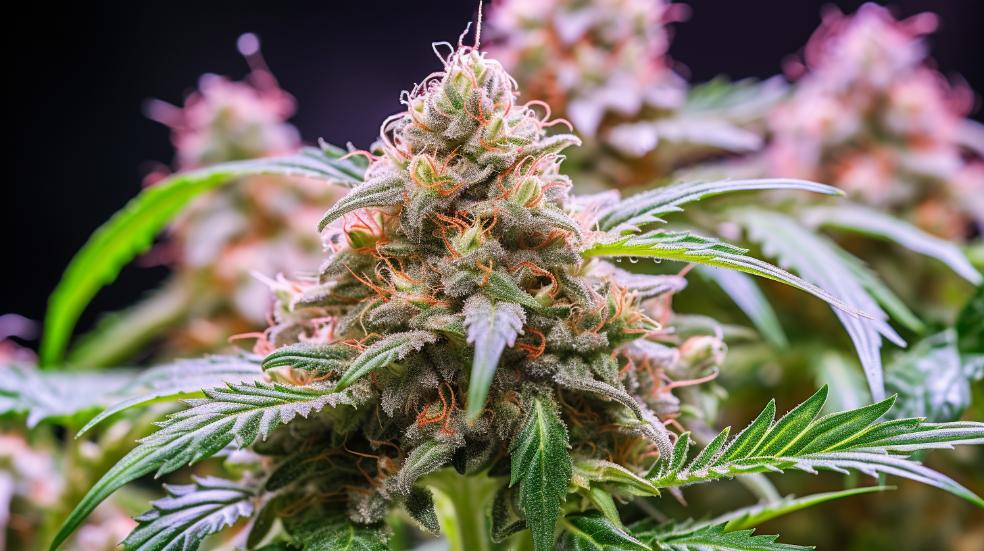
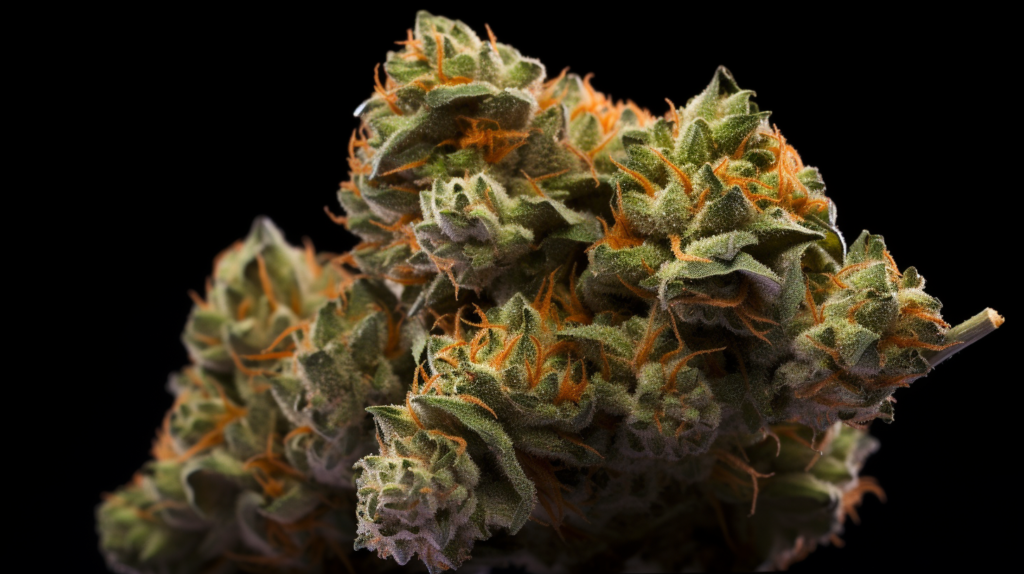
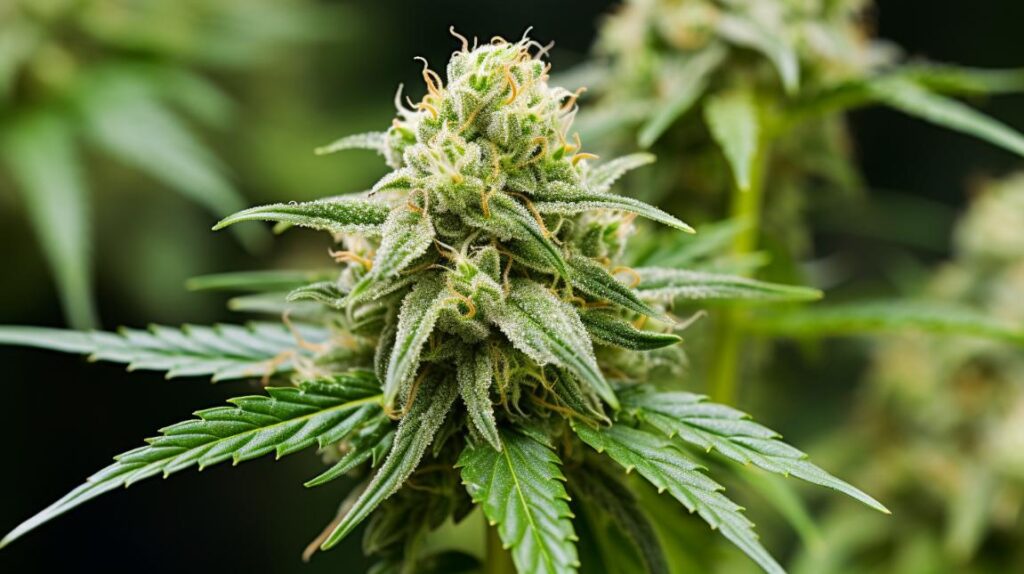
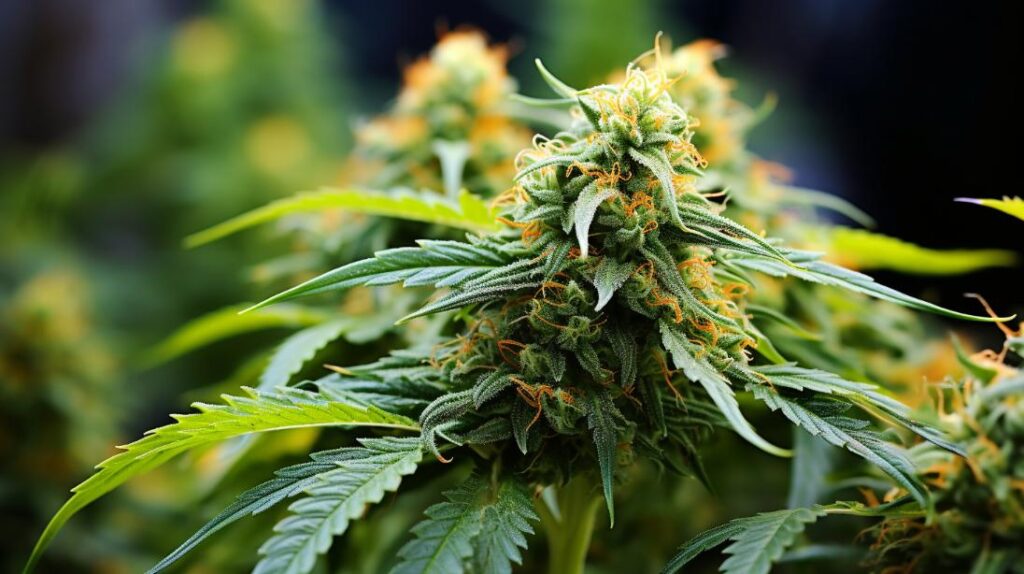
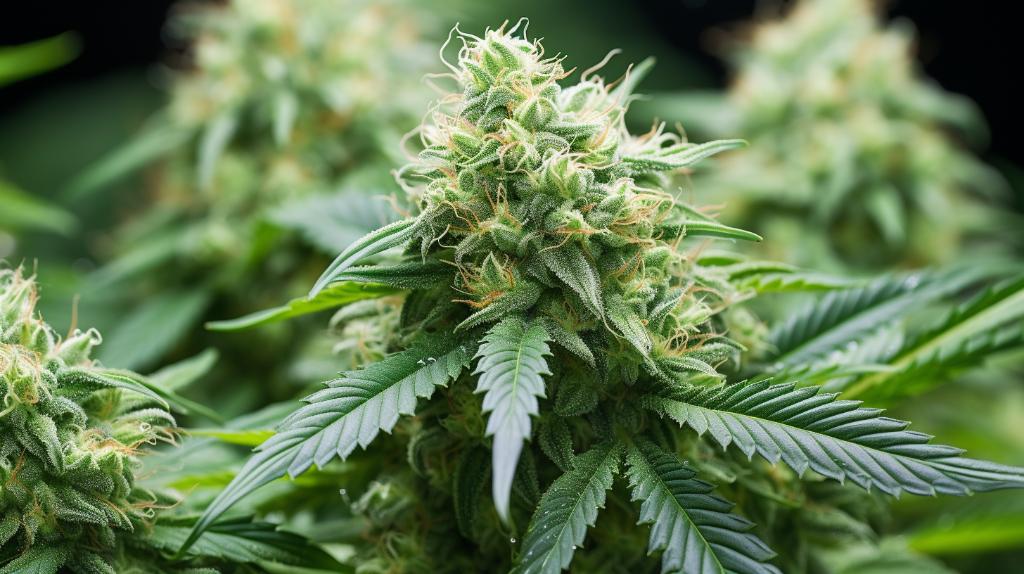

Responses